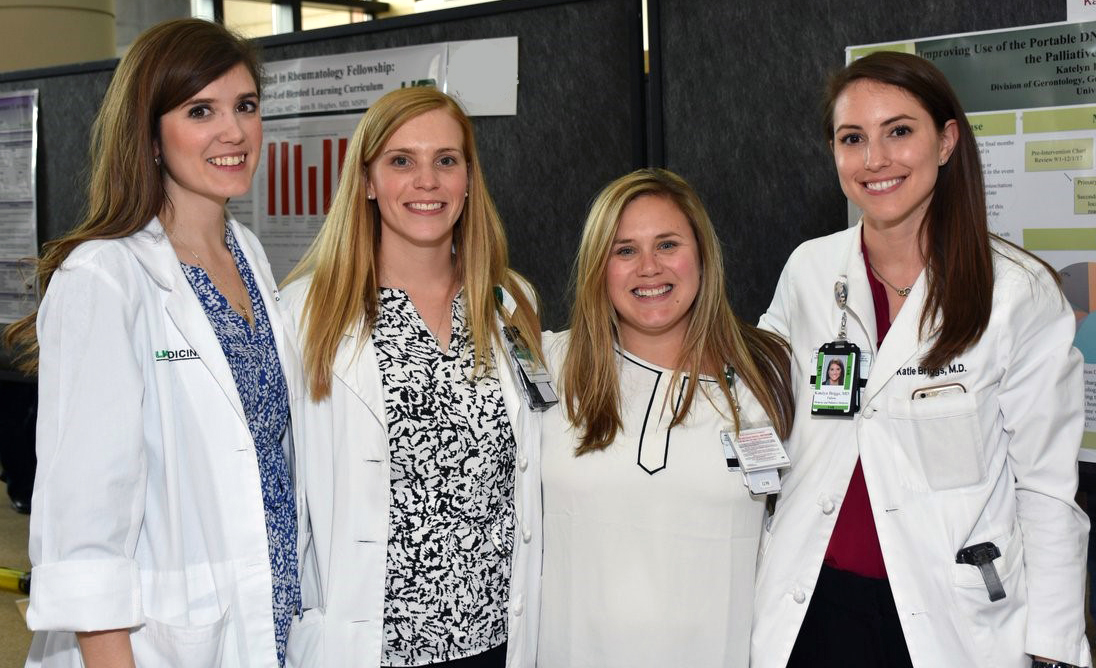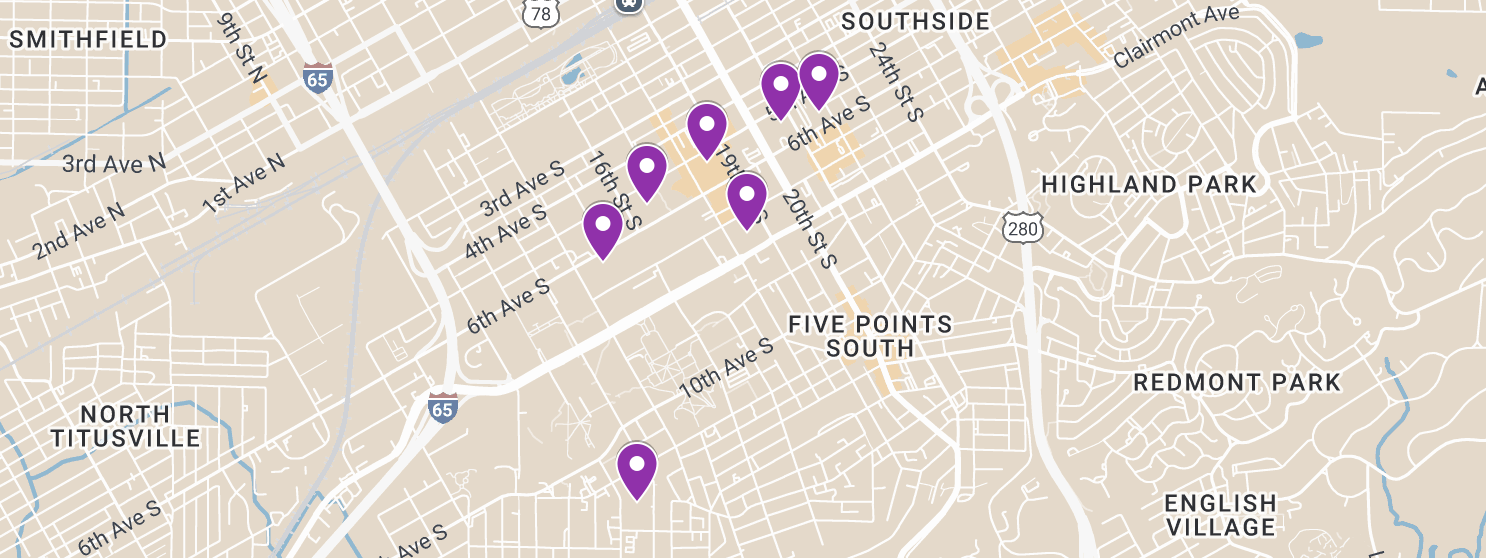In our comprehensive fellowship program, you will receive a broad range of hands-on clinical experience and individualized instruction from nationally known physicians and investigators in a collegial environment.
Fellowship Experience
Our program provides superior training in a collaborative environment. We have specialty clinics across our medical campus, which is anchored by our 1,200 bed inpatient center UAB Hospital—the eighth largest public hospital in the nation. The hospital is in close proximity to the Birmingham VA Medical Center, UAB Hospital Highlands campus, and the Kirklin Clinic.
Patients come from all over the state to take advantage of our life-changing care, offering a diverse population and breadth of clinical learning opportunities. We approach medicine in a multi-disciplinary modality across a broad variety of conditions through mandatory and elective rotations. We accept applications through the Electronic Residency Application Service.
Clinical Rotations
 UAB is a highly walkable campus, making it easy to navigate your clinical rotations. Many of our clinical training sites are connected by skybridges, offering protection from rain, heat, and traffic. Browse these buildings to learn more about the types of training conducted there.
UAB is a highly walkable campus, making it easy to navigate your clinical rotations. Many of our clinical training sites are connected by skybridges, offering protection from rain, heat, and traffic. Browse these buildings to learn more about the types of training conducted there.
Explore our training sitesOpens an external link.
Through the UAB Outpatient Geriatric Continuity Clinic, you will provide care for complex older adults with multiple medical, social, and psychological problems. In most situations, you will provide ongoing primary and geriatric subspecialty care for these patients.
Fellows also attend the VA Geriatrics Assessment Clinic several times per month while on a block month rotation, providing outpatient consultative care focused on comprehensive geriatric assessments where you will become accomplished at assessing, diagnosing, and managing many geriatric syndromes including mood disorders and dementia.
You will provide care for patients in skilled post-acute care and long-term care settings. Common conditions include post-hip fracture or joint replacement, infections, stroke, metabolic disorders, cardiovascular disorders, musculoskeletal pain syndromes, malnutrition, and polypharmacy.
You will gain experience in both inpatient and outpatient Physical Medicine & Rehabilitation by attending a wide variety of clinics and will spend a quality time learning principles of rehabilitation consultation. In addition to working in UAB Spain Rehabilitation Center, a state-of-the-art free-standing acute rehabilitation facility on the UAB campus, settings also include the VA Cerebrovascular Disease (“Post-Stroke”) Clinic, UAB Movement Disorders Clinic, VA Fall Prevention and Mobility Clinic, Physical Therapy, and Speech Therapy.
In the palliative medicine rotation, you will gain experience in the provision of palliative medicine care to geriatric patients in a variety of settings, with an emphasis on complex pain and non-pain symptom management, management of palliative care emergencies, managing conflict and establishing goals of care, estimating and communicating prognosis, managing withdrawal of advanced life-sustaining therapies, and caring for the imminently dying patient.
Training Conferences
UAB Gerontology, Geriatrics and Palliative Care Division Grand Rounds is held most Thursdays at noon throughout the year and includes talks on Clinical, Inter-professional, and Educational topics related to the treatment of Geriatric Medicine and Hospice & Palliative Medicine patient populations.The goal of these conferences is to provide educational opportunities and updates on the latest research within the division and globally within the field of geriatrics and palliative medicine.
Fellows will participate in a monthly Fellows’ Most Difficult Case Conference (FMDCC) and will have the opportunity to present their own case once during their fellowship year.
Research Opportunities
The UAB Geriatric Medicine Fellowship will support the travel and registration expenses for 2 conferences a year, the American Geriatric Society (AGS) Annual Meeting and the Society for Post-Acute and Long-Term Care Medicine (AMDA) Annual Meeting.
You will meet quarterly with Palliative Medicine fellows to plan, develop, and present a scholarly or quality improvement project. Workshop topics include: 1) Defining a Question, Methodologies, and Mentorship, 2) Works-in-Progress, 3) Abstracts and Posters, and 4) Presentation and Dissemination. Over the course of your fellowship, you will submit your scholarly project to local and national meetings, present 1-2 journal clubs, 1-2 case conferences, and the final Grand Rounds presentation of your scholarly project.
Let's get acquainted
It's not just what you learn. It's also about the people you learn with. Our Geriatric Medicine fellowship program leaders are dedicated to developing the potential of every talented trainee.
Meet our people
Frequently Asked Questions
-
What will I need to apply?
All applications are reviewed via Electronic Residency Application Service® (ERAS). For Palliative Care, #1007540F0. For Palliative Care Med/Peds, #1007540F1. The following documents are required:
-
Current CV (updated within 3 months)
-
Medical School Transcripts (and diploma if requested)
-
Medical School Dean’s Letter
-
Three (3) total Letters of Recommendation (including former program directors)
-
Certificate/verification from previous residency training
-
Must be eligible for Alabama Medical License and Alabama Controlled Substance Certificate (all step scores completed at the time of application)
-
Must be eligible for Federal DEA registration
-
Valid ECFMG Certificate (IMG only)
We do not accept any addtional documents outside of ERAS submissions.
-
-
What are the salaries & benefits for fellows?
Our program provides benefits and insurance plans available to all fellows at UAB. You can find the list of salaries and benefits for fellows based on PGY level here.
-
What is the cost of living in Birmingham?
Birmingham offers a vibrant urban lifestyle at a cost that’s approximately 9% below the national average. Trainees enjoy access to thriving neighborhoods, a nationally recognized food scene, and a dynamic creative community.
-
Is there a minimum USMLE score required?
There is no minimum USMLE score requirement. We take the score into account as part of the overall review of an application.
-
What are the key program dates for Applications?
Applications Open and Close — June through May: Apply through ERAS
Applications Reviewed — July, must be available by August 1
Interview Invitations Released — last week in August
Interviews Begin — September and continue through October
Match Day — November
Fellowship begins — July 1
-
Do you sponsor H1B or J1 Visas?
Yes, the division can sponsor these Visas.
Want to learn more? Start a conversation with us.
 I'd be delighted to talk with you about the many exciting possibilities that await you at UAB and Birmingham. Contact me for more details about your fellowship.
I'd be delighted to talk with you about the many exciting possibilities that await you at UAB and Birmingham. Contact me for more details about your fellowship.
Elizabeth McAlister, Education Administrator
Send an Email
 I'm always ready to discuss our individualized approach to train future clinicians and researchers in the engaging practice of geriatric medicine.
I'm always ready to discuss our individualized approach to train future clinicians and researchers in the engaging practice of geriatric medicine.
Mark Newbrough, M.D., Associate Professor of Medicine
Send an Email